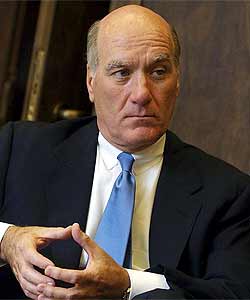 It hasn’t been a great few days for President Obama’s Chief of Staff Bill Daley. He has been sliced, diced, dismissed, dissed in Politico, the New York Times, the Chicago Tribune, not to mention the Huffington Post and New York magazine.
It hasn’t been a great few days for President Obama’s Chief of Staff Bill Daley. He has been sliced, diced, dismissed, dissed in Politico, the New York Times, the Chicago Tribune, not to mention the Huffington Post and New York magazine.
In all of these publications, Daley is portrayed as overly corporate, hierarchical, averse to the down-and-dirty of politics, the bull sessions and bullshitting with people (such as members of Congress) who can help advance his boss’s program.
In these remarkably similar portraits that popped up late last week and continued into this weekend, Daley is the anti-Rahm Emanuel—his door closed against the messiness of politics, the irritating half-formed or contradictory opinions and the Obama people who had once delivered them to his ear or, almost as good, to Rahm’s. (Rahm’s door, it’s often noted, was almost always open, in part as a tactic—his profane tirades intended to intimidate the ill-prepared, slow-thinking, or slow-moving.)
In a book to be published tomorrow, Confidence Men: Wall Street, Washington, and The Education of a President, former Wall Street Journal reporter Ron Suskind notes that Rahm was not Obama’s first choice as chief of staff. This time around, in choosing Daley, the president or his men should have known exactly what they were getting. Obama did not have an especially close relationship with Bill, but Rahm certainly did. When I interviewed then-Congressman Emanuel for a profile I was writing of Daley for this magazine, Rahm told me that he talked to Bill everyday, that they were “best friends.” (There has been talk out there—never documented—since Daley’s selection last January, that the appointment of Daley represented an implicit deal: Rahm gets Rich Daley’s unspoken support in his run for mayor in exchange for sealing the deal for brother Bill to become Obama’s chief of staff.)
I found remarkable consistency in my interviews for the Daley profile in the portrayal of man who loved to cogitate about politics, dispense advice, and take calls from strategists from his huge, gleaming office at Chase. Over the years, there have been plenty of reports of Bill agonizing over whether to run for governor or U.S. senator or even mayor (once his brother stepped down). But he never quite managed to dip his shiny loafer in the muck.
After reading the first of the Daley-bashing pieces in Politico, I went back and looked at transcripts of people I’d interviewed about Daley’s tenure as chairman of Al Gore’s 2000 campaign. Late in the campaign, a flailing Gore fired former Congressman Tony Coelho as his campaign chairman and brought in Daley, then the commerce secretary. Gore had moved his campaign headquarters from D.C. to a strip mall in Nashville. Many folks I interviewed told me that Daley kept strict banker’s hours. “It was almost as if he had to run to some cocktail party,” said one top aide, who didn’t not want her name used. “He did not work a minute beyond five. Anybody who has been involved in a presidential campaign knows you don’t turn your lights off until way after midnight.”
Political guru Donna Brazile, then Gore’s campaign manager, gave me a particularly detailed picture of Daley at that time. He arrived every workday in a beautifully cut suit. No late-night, sleep-deprived, pepperoni- and Coca-Cola-fueled strategy sessions for him. “I tend to lean toward the … Tony Coelhos who are … more engaged in rough-and-tumble politics—as opposed to what I call executive politics,” she said. Brazile recalled in our September 2004 interview that Daley was “very formal”; his style the opposite of her “street organizing politics.” Daley sometimes “ran the campaign like a board meeting… he would make a great CEO.” [as in corporate, not campaign].
Brazile made much of Daley’s appearance—she laughed at the very idea of seeing him in jeans or khakis. She compared her office—“my desk was like a battlezone”—to his: “When I went into Bill Daley’s office, I felt like I was entering a CEO office. There was no paper, there was nothing. His greatest asset was that he was able to keep the ships running on time.” She added, in his defense, “There are a lot of ships in a presidential campaign.”
Photograph: Chicago Tribune


